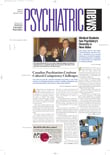Legislation to renew the federal J-1 visa waiver program sailed through Congress last month and is headed for the president's signature.
APA and the American Medical Association supported passage of the Access to Rural Physicians Improvement Act of 2004 (HR 4453/S 2302), which renewed the program that expired on June 1 for two years, until 2006.
AMA Executive Vice President Michael Maves, M.D., wrote to House Speaker Dennis Hastert (R-Ill.) last month that “HR 4453 would help ensure that physicians are placed in appropriate settings to serve patients in underserved areas,” according to an AMA press release.
Nearly every state participates in the J-1 visa waiver program in which noncitizen foreign-trained physicians who finish residency training are recruited to work in underserved rural and/or urban areas. About 20 million Americans live in areas where there are not enough physicians to meet their medical needs (Psychiatric News, August 2, 2002).
The waiver of the J-1 visa residency requirement is attractive to many international medical graduates (IMGs) who prefer to work in the United States after finishing their postgraduate training rather than return home for two years and apply for a different type of visa.
However, the original intent of the J-1 visa program, administered by the U.S. Information Agency (USIA) in the 1960s,was to encourage educational and cultural exchanges between the United States and foreign countries in the post–cold war era.
IMGs could apply for nonimmigrant temporary status to obtain postgraduate medical training in the United States if they stated that they intended to return to their home countries after training.
“The goal was to give people training and experience in the U.S. they could use to benefit their home countries,” the AMA stated in its June 2002 “Report on J-1 Visa Waivers.”
But by the early 1970s, the J-1 visa policy was widely criticized for encouraging IMGs to immigrate to the United States, thus creating a brain drain of physicians from developing countries, according to the AMA report. In 1982 the AMA called for an end to preferential immigration policies for foreign medical graduates
Congress tightened preferential immigration policies and laws between 1976 and the early 1980s, according to the report.
In 1999 the USIA was merged with the U.S. Department of State, which reviews applications for waivers on a case-by-case basis. Physicians who came to the United States on a J-1 visa for graduate medical training could apply to have the requirement that they return to their home country waived if they anticipated persecution or exceptional hardship to a spouse or child. In addition, “an interested U.S. government agency can request the waiver because the visitors' acquired skills are in short supply within the U.S.,” according to the report.
Several government agencies have served as interested parties requesting waivers, including the Department of Agriculture (USDA). Between 1994 and 2001, the USDA requested about 3,000 waivers. The USDA withdrew from the waiver program in late 2001, stating that it lacked the resources to conduct security background checks on all applicants following the September 11 attacks. The Department of Health and Human Services has attempted to fill the void left by the USDA and began reviewing J-1 visa waiver applications last year.
In 2002, 46 states participated in the federal J-1 visa waiver program.
The State Department continues to conduct security checks on all J-1 visa waiver applicants before it makes recommendations to the Bureau of Citizenship and Immigration Services in the Department of Homeland Security.
